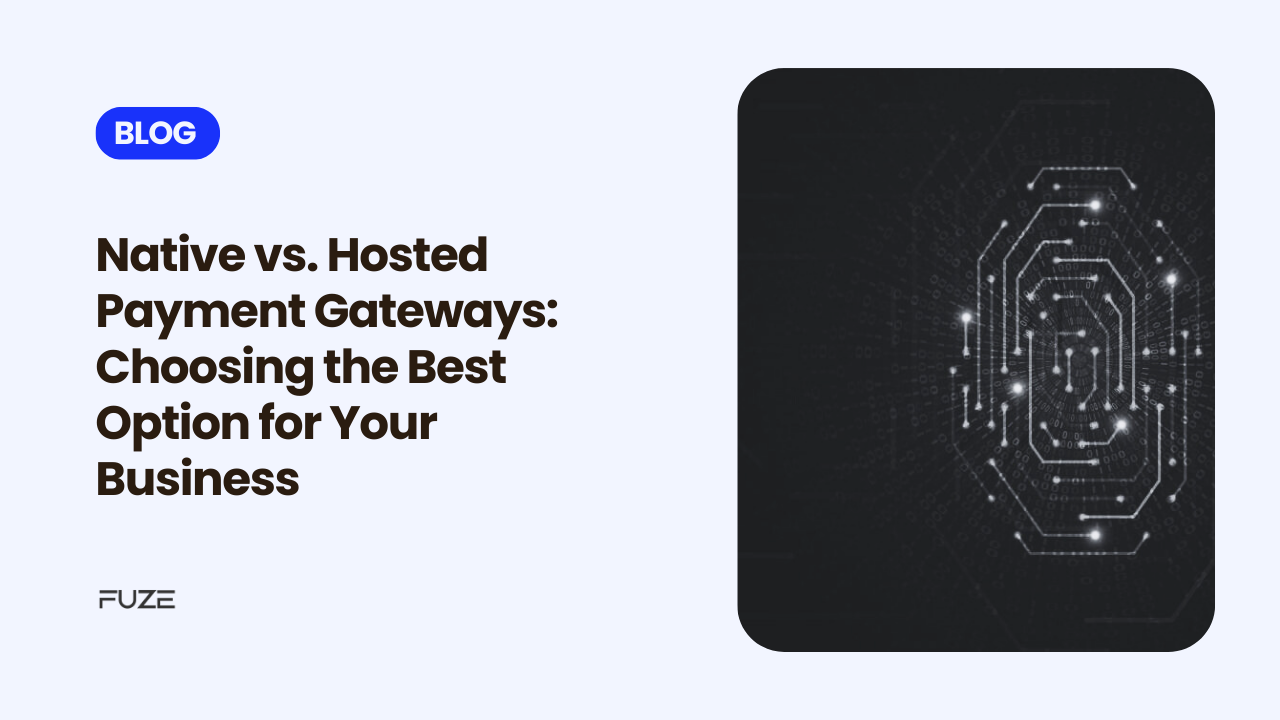Choosing the right type of payment gateway for your online platform is one of the most crucial decisions to make. Payment gateways are the backbone of online transactions, enabling a seamless transfer of funds between businesses and their customers.
Two primary types of payment gateways dominate the landscape: native payment gateways and hosted payment gateways. Each has its strengths and weaknesses, making it vital to understand their nuances to determine the best fit for your business needs. In this blog, we’ll explore the differences between these gateways, their advantages and drawbacks, and factors to consider when making your decision.
What is a Payment Gateway?
A payment gateway is a technology that facilitates online transactions by securely transferring payment information between the customer, merchant, and payment processor. It ensures sensitive data, like credit card details, is encrypted and transmitted safely. Payment gateways can be categorized into native and hosted solutions, each offering distinct user experiences and technical features.
Native Payment Gateways: A Deep Dive
A native payment gateway is integrated directly into your website or application, allowing customers to complete transactions without being redirected to a third-party site. These gateways are often customized to align with the branding and functionality of your platform.
Advantages of Native Payment Gateways
- Seamless User Experience:
Customers remain on your website or app throughout the checkout process, providing a cohesive experience that enhances trust and reduces drop-offs. - Customization:
Native gateways can be tailored to meet your branding and business requirements, offering a more personalized payment flow. - Advanced Features:
Businesses can incorporate features like one-click payments, recurring billing, or detailed analytics into the payment process. - Control:
Since the payment gateway is part of your platform, you have greater control over the customer journey, security measures, and transaction processes.
Drawbacks of Native Payment Gateways
- Higher Implementation Costs:
Setting up a native gateway can be resource-intensive, requiring technical expertise and potentially higher development costs. - Security Responsibility:
Businesses must comply with strict regulations like PCI DSS (Payment Card Industry Data Security Standard) to ensure secure handling of sensitive data. - Maintenance Requirements:
Ongoing management, updates, and troubleshooting are the responsibility of the business, requiring additional effort and resources.
Hosted Payment Gateways: An Overview
A hosted payment gateway redirects customers to a third-party platform to complete their transactions. Once the payment is processed, the customer is directed back to your website.
Advantages of Hosted Payment Gateways
- Ease of Integration:
Hosted gateways are relatively simple to set up, making them a popular choice for small to medium-sized businesses. - Lower Security Burden:
The gateway provider handles compliance with security standards, reducing your liability and effort in managing sensitive customer data. - Reliability:
Established hosted gateways often come with robust infrastructure and fraud prevention tools, ensuring smooth and secure transactions. - Cost-Effectiveness:
Hosted solutions typically have lower upfront costs, making them accessible to businesses with limited budgets.
Drawbacks of Hosted Payment Gateways
- Redirection Risks:
Redirecting customers to another site can disrupt the user experience, potentially leading to higher cart abandonment rates. - Limited Customization:
Hosted gateways have predefined templates and limited options for branding or tailoring the payment experience. - Dependency on Third Parties:
Your business relies on the uptime and performance of the gateway provider, which could pose risks during outages or downtime.
Comparing Native and Hosted Payment Gateways
| Feature | Native Payment Gateways | Hosted Payment Gateways |
| User Experience | Seamless and integrated | Redirects to third-party site |
| Customization | Highly customizable | Limited customization options |
| Implementation Cost | Higher | Lower |
| Security Management | Business responsibility | Managed by provider |
| Maintenance | Requires ongoing support | Minimal business involvement |
| Scalability | Scales with business needs | Provider-dependent scalability |
| Best for | Established businesses with resources | Small to medium-sized businesses |
How to Choose the Right Gateway for Your Business
When deciding between a native and hosted payment gateway, consider the following factors:
1. Business Size and Budget
- Small or Medium Business: Hosted gateways are cost-effective and easier to implement.
- Large Business: Native gateways offer better control and scalability for established enterprises.
2. User Experience Goals
- If seamless customer experience is a priority, a native gateway ensures smooth checkout without redirection.
- Hosted gateways may suffice for businesses that don’t rely heavily on repeat customers or brand loyalty during checkout.
3. Security Capabilities
- Opt for a hosted gateway if your business lacks the expertise or resources to manage security and compliance.
- Choose a native gateway if you can invest in robust security infrastructure and compliance measures.
4. Technical Resources
- Hosted gateways are ideal for businesses with limited technical expertise.
- Native gateways require skilled developers for implementation and maintenance.
5. Growth Plans
- Hosted gateways are a great starting point for businesses testing the waters of e-commerce.
- Native gateways are better suited for businesses aiming to scale and offer advanced features.
Use Cases for Native and Hosted Payment Gateways
Native Gateway Use Cases:
- Subscription-Based Businesses:
Companies offering recurring billing (e.g., SaaS platforms) benefit from the control and flexibility of native gateways. - E-Commerce Giants:
Large-scale retailers need a seamless, branded checkout experience to maximize conversions and enhance customer trust. - High-Volume Businesses:
Enterprises processing a large volume of transactions can justify the higher cost and effort of maintaining a native gateway.
Hosted Gateway Use Cases:
- Small E-Commerce Stores:
Startups and small businesses benefit from the affordability and simplicity of hosted solutions. - Niche Marketplaces:
Platforms with less frequent transactions can use hosted gateways without sacrificing too much on user experience. - Trial-Phase Businesses:
Entrepreneurs testing new products or services can leverage hosted gateways for quick setup and low risk.
The Future of Payment Gateways
As digital payment systems evolve, hybrid solutions are emerging that combine the best of native and hosted gateways. These hybrid models offer streamlined integration, better customization options, and shared responsibility for security. Additionally, advancements in blockchain technology and decentralized payment methods are pushing the boundaries of what payment gateways can achieve.
Conclusion
Choosing between a native and hosted payment gateway is a critical decision that directly impacts your business’s bottom line. While native gateways provide unmatched control and seamless user experiences, hosted gateways shine in affordability and simplicity. Understanding your business’s unique needs, technical capabilities, and growth plans will help you make an informed choice.
Both options have their merits, and the right choice depends on striking a balance between user experience, security, and cost-effectiveness. Whether you opt for a native or hosted solution, prioritizing a smooth and secure payment process will build customer trust and drive long-term success in today’s competitive digital marketplace.
Disclaimer: Virtual assets carry significant risks, including high volatility and potential loss of your entire investment. They are not backed by governmental protections, and recourse may be limited in case of loss. Always assess your risk tolerance, fully understand the risks, and seek independent financial advice if needed before investing.
Frequently Asked Questions
Which businesses are best suited for native payment gateways?
Native gateways are ideal for:
- Large businesses with high transaction volumes.
- Enterprises that require extensive customization and advanced features.
- Companies with the resources to manage security and compliance.
Which businesses should opt for hosted payment gateways?
Hosted gateways are best for:
- Small to medium-sized businesses seeking affordable and easy-to-implement solutions.
- Startups and entrepreneurs testing new products or services.
- Businesses without in-house technical expertise for payment management.
What are the security implications of using native vs. hosted gateways?
- Native gateways require businesses to comply with stringent security standards like PCI DSS, increasing responsibility but offering more control.
- Hosted gateways shift the security burden to the provider, reducing liability for the business.
How do these gateways affect the user experience?
- Native gateways provide a seamless and consistent checkout experience, enhancing customer trust and reducing cart abandonment.
- Hosted gateways can disrupt the user experience due to redirection, which might lead to higher drop-off rates.
What are the cost differences between native and hosted payment gateways?
- Native gateways typically involve higher upfront development and maintenance costs.
- Hosted gateways are more cost-effective initially, with minimal setup fees and no need for extensive technical resources.







